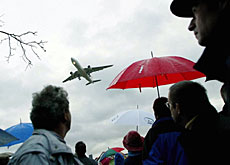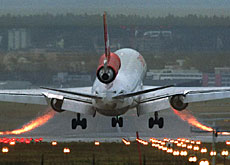Noise pollution gives Swiss a headache

Noise pollution is increasingly making Swiss lives a misery, with more air, road and rail traffic set to turn up the volume further.
Two out of three Swiss say noise has a negative effect on their lives, and experts claim its impact – particularly on people’s health – is totally underestimated.
Road traffic is the main offender in Switzerland but more and more people are being affected by noise pollution from aircraft.
Since October 30 more than 200,000 inhabitants stretching from the upper Lake Zurich region to the city suburb of Schwamendingen have woken to the sound of passenger jets flying overhead.
Restrictions imposed unilaterally by Germany mean early morning and night flights into the city’s Kloten airport now have to use a southern approach over residential areas.
Opponents of aircraft noise argue that their human rights are being abused, claiming they have a right to peace and quiet. They say the noise impinges intolerably on their quality of life.
“Many people are at the end of their tether. Permanent stress through noise can lead to long-term high blood pressure and an increase in cardiovascular illnesses such as heart attacks,” says Bernhard Aufdereggen from the organisation, Doctors for the Environment.
Interrupted sleep
Experts say noise can make you ill and is most damaging at night. They suggest that up to 80 people a year in Switzerland die from a heart attack caused by excess noise.
For those who are subjected to a sound level of between 65decibels (dB) and 55dB in the night, the risk of having a heart attack increases by 20 per cent.
More than three million people in Switzerland live in places where night-time noise outside their bedroom windows regularly reaches 46 dB. So-called “waking up reactions” occur at 30 dB.
Even if those affected do not wake up from the noise, their bodies release stress hormones, which lead to the common effects of a bad night’s sleep: depression, headaches and poor performance at work.
“Many people sleep badly and see this as normal,” says Doctor Laszlo Matefi. “Many illnesses would be less common if general health levels were improved by letting people sleep without interruption.”
High costs
Then there are the costs of noise pollution. Many cantons and communes find it difficult to follow federal government guidelines on how to reduce noise levels, for example by constructing noise barriers.
Under the current round of public spending cuts, the government wants to halve contributions to cantons and communes for the cost of building barriers.
The World Health Organization argues those who cause noise should have to pay for the damage it causes. This opinion is shared by Urs Jörg from the Federal Environment Agency.
“This principle must be anchored in law, so that the costs of noise pollution can be met by the offender.”
swissinfo, Stefan Hartmann
Two out of three Swiss feel that noise pollution has a negative impact on their lives.
The main causes are cars, railways and aircraft.
Noise can damage your health, leading to high blood pressure and an increase in cardiovascular illnesses such as heart attacks.

In compliance with the JTI standards
More: SWI swissinfo.ch certified by the Journalism Trust Initiative










You can find an overview of ongoing debates with our journalists here . Please join us!
If you want to start a conversation about a topic raised in this article or want to report factual errors, email us at english@swissinfo.ch.